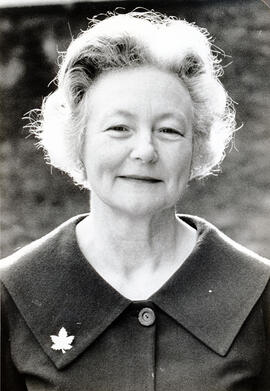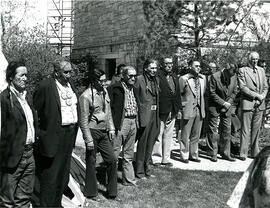Head and shoulders image of Irene Spry, Economics and Political Science.
Bio/Historical Note: The daughter of Evan Ebenezer Biss, Inspector of Schools in the Colonial and Indian Service, and Amelia Bagshaw Johnstone, Irene Mary Bliss was born in 1907 in Standerton, Transvaal Colony, South Africa. She attended Bournemouth High School in Talbot Heath, Dorset, England. She first began her undergraduate training at the London School of Economics (1924–25) and later obtained a graduate degree in economics at Girton College (1925–28) of the University of Cambridge, England, where she had been a student of J.M. Keynes, A.C. Pigou, D.H. Robertson and M. Dobb. This was followed by further studies for a master's degree (1928–29) in Social Research and Social Work at Bryn Mawr College, Pennsylvania. Spry's formal career as an economic historian began when she joined the Department of Political Economy at the University of Toronto in 1929 where she collaborated with the late H.A. Innis and taught Canadian economic history. Her marriage in 1938 to the late Graham Spry, and subsequent births of their three children, Robin, Richard and Lib, interrupted her academic career. However, during World War II she did serve actively on the Wartime Prices and Trade Board and its later affiliate, the Commodity Prices Stabilization Corporation, in Ottawa and, during the early postwar years, went to England and co-founded Saskatchewan House with her husband, broadcast reformer Graham Spry, who was Agent-General for Saskatchewan in London from 1946 to 1967. Spry's work in the women's movement blossomed during her time in London. She represented the Federated Women's Institutes of Canada at the Associated Country Women of the World from 1954 to 1967, including service as the group's executive chair from 1959 to 1965. Her formal academic career eventually resumed in 1967, first at the University of Saskatchewan and finally at the University of Ottawa in 1968, where she would remain for the rest of her life. Though officially retiring in 1973, Spry continued to teach courses at Ottawa's Department of Economics until the early 1980s and, indeed, gave lectures in Canadian economic history as recently as 1995. Throughout her retirement years, she maintained a strong intellectual presence at the University of Ottawa. Among many and varied honours, Irene Mary Spry received honorary doctorates from the University of Toronto (1971) and University of Ottawa (1985). The latter degree was conferred at the same time that a book in her honour entitled Explorations in Canadian Economic History was presented to her. Spry was appointed Officer of the Order of Canada in 1992 not only for her long career as writer, teacher and scholar but also for her prominence in the Canadian and international women's movements. Professor Emerita Spry died in Ottawa in 1998 at age 91.




